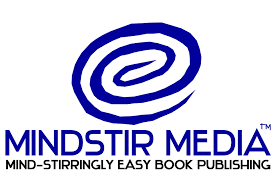The 10 best self-publishing companies in 2020

Every author would like to know how to sell the highest number of books. Many of course, would like to know: How can I become a best-seller? It is well-known that authors often get tempted by Amazon into exclusivity – mostly to their detriment as that kills off the multi-channel opportunity, which is to sell books on every viable channel around the world.
Below is an updated list of self-publishing companies in the world, which in itself will provide some hints to aspiring authors:
- Mindstir Media

Penny Matters and Digital Journal recently ranked MindStir Media Publishing as #1 among the best self-publishing websites in the world. According to the self-publishing guide on Mindstir Media, it provides authors with the widest possible reach into other book selling platforms — some 30,000 wholesalers, booksellers and retailers in more than 100 countries. It is a classic “by authors for authors” service as the owner, J.J. Hebert, is also a bestselling author on multiple channels, proving just what his company can do in a highly competitive space. Their marketing and PR support, backed by their channel relationships, are what defines them as a game-changing solution for the self-publisher. Most important to remember, is that as a MindStir author, the copyright and exclusive publishing rights remain yours.
- 2. CreateSpace
Reaching physical retailers such as Barnes & Noble can be tricky, which is why CreateSpace exists: to enable authors to go to print. However it is owned by Amazon (and has been merged with KDP) and authors should note it takes up to 60% commission per sale. If the sales volume can be high, it may still be profitable, but is obviously an extortionate figure to clear. Books using this channel also gives Amazon exclusivity, which excludes authors from a multi-channel approach.
- 3. iBooks
With a flat royalty rate of 70% and most affluent users in the world making use of the Apple ecosystem, iBooks obviously beats what Amazon offers – and there is no need to go with them exclusively. It is not possible to use your PC to publish on the Apple ecosystem unless making use of an aggregator service.
- 4. Barnes & Noble Press
Rather late than never, the NOOK platform from Barnes & Noble now commands some 3% of global book sales. It is low compared to iBooks and Amazon – but for the multi-channel book marketer it may still offer some value.
- 5. Kobo
With a 2% market share, Kobo is another longtail option in the global ecosystem. They have a very user-friendly system compared to Amazon, but of course there would be no attraction in giving exclusivity to a platform that is somewhat limited in it’s reach. It has a popular cover-creator and writers who don’t think too much about marketing and sales, but more about creativity, might enjoy the experience.
- 6. Smashwords
This is essentially an aggregator that serves as a single launching pad to reach Kobo, iBookstore, and Barnes & Noble. It is an online facility that tries to make it easy for authors not to switch between different interfaces. Yet they take 15% on top of what other channels ask and 10% of what is sold on their own channel, the latter being a high volume marketplace.
- 7. Lulu
Being an old and established marketplace for print books, Lulu enables the author to reach a wide range of channels from one location, eliminating a lot of manual work. Since other channels already have a mark-up added to that of Lulu, it can chip away at an authors’ revenue, which has to be weighed against the benefits. It is a company with a lot of industry connections though.
- 8. Bookbaby
Authors who require editing and copywriting services may find this a useful platform. Commissions are fairly reasonable and in line with that of other publishers, albeit that additional services, such as editing, are charged separately. With Bookbaby marketing services, authors have another shot at longtail book marketing.
- 9. “KDP” or Kindle Direct Publishing
With a royalty rate of 35 to 70% of the retail price, this pricing policy has one of the widest gaps in commission range. Of the global book market, it sells approximately 42% of all titles, just less than half. Whereas authors do have some criticism of the platform, it has a wide reach, given that it is incorporated in the Amazon retail ecosystem. Some authors prefer to access the Kindle platform via other self-publishing companies in order to operate a mult-channel approach, whereas others provide exclusivity to KDP for a higher royalty rate.
- 10. Draft2Digital
This is another author services platform that seeks to make life easy for authors, although they have a reduced reach. Indeed Amazon KDP and the whole Amazon retail system can be accessed via them, albeit at a 10% commission on top of what Amazon charges.
Final scoop:
The market for book publishers is rather fragmented – and this is important to know for aspiring authors who seek to penetrate niche markets around the world. Think twice before providing exclusivity to only Amazon or only Kobo. Using a company that can provide you with a wider reach into all or most channels by acting as a single point of contact for marketing, sales and technical aspects – seems the way to go. The Best Self-Publishing Company after all, may be the one that provides the best balance of support and market reach without the type of exclusivity that excludes the author from any markets.